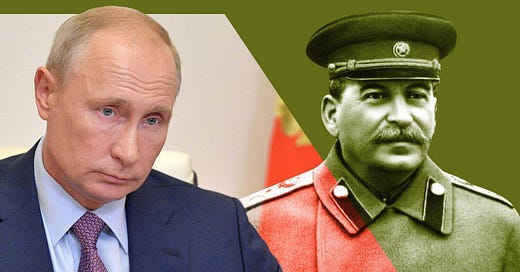To Justify His Unjustifiable War in Ukraine, Vladimir Putin Rewrites History and Invents a Glorious Past.
The harder it will be to wake up from this nightmare for the Russian people.
A few weeks ago, on April 10, 2022, in the middle of the Ukrainian war, two columns of dozens of trucks and Kamaz excavators suddenly appeared on the road to Smolensk, Russia, and with Russian flags flying, they aggressively drove towards the Katyn monument. The disturbing “Z” signs, displayed on the vehicles, which all Russian army equipment in Ukraine…
Keep reading with a 7-day free trial
Subscribe to Sylvain Saurel’s Newsletter to keep reading this post and get 7 days of free access to the full post archives.




